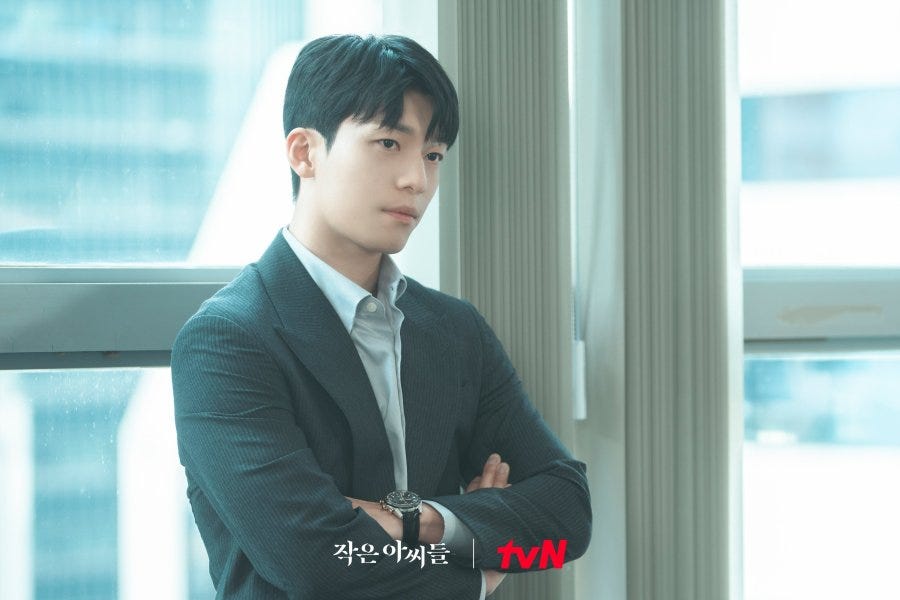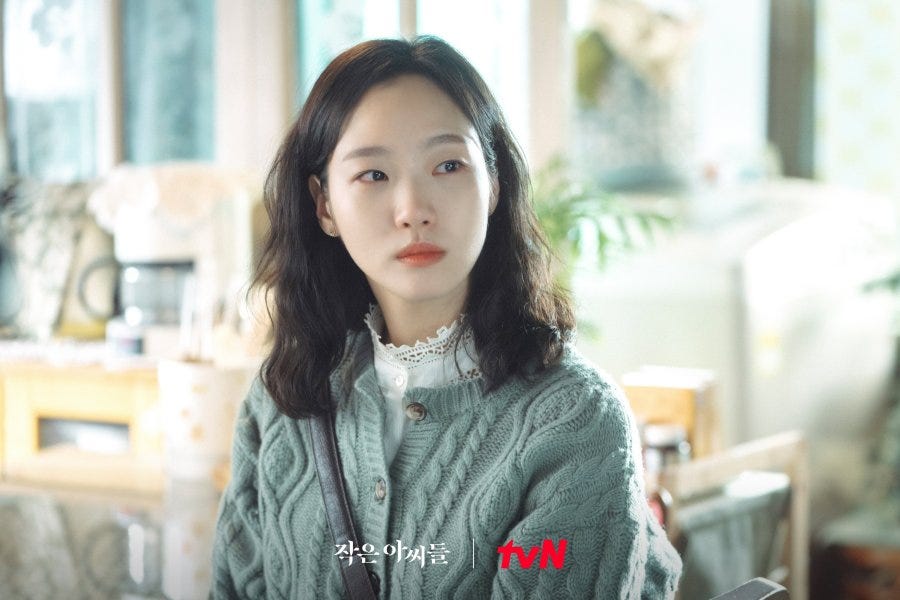Little Women (2022) Episodes 3 and 4 Musings
From the perspective of a viewer and a parent, there has always been something nerve-wrecking and deeply disturbing about Oh In-hye’s relationship with the Park-Won family. It’s fraught with all kinds of moral, ethical and spiritual transgressions to say the least. It isn’t just that she’s being used so nakedly as a pawn to further their political aspirations but that there’s also something Hansel and Gretel like about the way they furtively lure her into their fold with their seeming generosity. This feeling of unease is only reinforced in the latest episode when In-hye is given access to the mysterious blue orchid garden and her own orchid. The ghost orchid as it is nicknamed, acts also as a hallucinogen — an agent of control over its intended target. Park Jae-sang and Won Sang-a are clearly grooming In-hye with goodies in the same way the wicked witch in the Brothers Grimm’s story attempts to entice hungry deprived children into her house. Once they fall into her trap, she fattens them up before devouring them. Likewise the suave Park Jae-sang with his good looks and calm demeanour somehow manages to convey a predatory aura.
For a girl who has grown up as one of the have-nots her entire life, In-hye is especially susceptible and easily dazzled by the conspicuous display of wealth on offer. All she can see are the symbols of plenty — objects denoting the triumph of materialism. What she doesn’t know at this point is that they are ill-gotten gains. Park Jae-sang condones her theft of the doll from the dollhouse and appeals to her greed to instruct her on the ways of success. He too was a poor boy who did whatever he had to (including murder no doubt) to earn his right to live in that house. It’s a very troubling scene not the least because a grown man is spending quality time alone with a relatively naive school girl who is mesmerized by his “greed is good” speech.
In the preface to Louisa May Alcott’s Little Women, she adapts a poem from John Bunyan’s Pilgrim Progress to inform the reader of her intentions regarding her work.
“Go then, my little Book, and show to all
That entertain, and bid thee welcome shall,
What thou dost keep close shut up in thy breast;
And wish what thou dost show them may be blest
To them for good, may make them choose to be
Pilgrims better, by far, than thee or me.
Tell them of Mercy; she is one
Who early hath her pilgrimage begun.
Yea, let young damsels learn of her to prize
The world which is to come, and so be wise;
For little tripping maids may follow God.
Along the ways which saintly feet have trod.”
— Adapted from JOHN BUNYAN.
Like the show’s namesake, the story positions itself as a fable, a teaching tool or an instruction manual not just for unsuspecting young ladies navigating the world of wolves and witches but for busy parents navigating the world outside the home. In the same way that the irresponsible Oh parents abandoned their girls, the main reason why In-hye is easy pickings to the unsavoury rich is the lack of parental oversight — noticeable by their absence. Their father’s still gambling what little there is of the family fortune and their mother harvesting mangoes to pay off his debts. Whether one agrees, the message here is that the root of poverty here apparently isn’t the lack of wealth but family dysfunction.
It’s clear that while the sisters have plenty of pluck and love for each other they are in over their heads with regards to the Park-Won juggernaut. Choi Do-il is right. These aren’t just rich snobby people who flaunt their money around because they think they’re the master class. They’re looking to buy absolute power. Five people so far that we know about have died. Goodness knows where the other bodies are buried. At this point one can easily surmise that 70 billion won is most likely the tip of the iceberg.
Without help, the sisters aren’t going to survive the looming fiasco. Independence isn’t enough. Hwa-young even with all her street smarts didn’t make it and planned for that eventuality. Neither did the conniving Director Shin with all his years of experience doctoring books and siphoning funds. So how does In-joo or even In-kyung think they protect each other much less emerge victorious and hang on to any cash that’s left when the dust has settled?
What In-joo has going for her is likeability. Choi Do-il calls her a game changer for that reason. That’s her superpower. People warm up to In-joo because she is unassuming and guileless. People trust her easily because of her natural affability. Hwa-young factored her into her plans for a reason. Won Sang-woo gave up the ledgers in his keeping because he too sensed she could be trusted. Occasionally In-joo has her moments but her emotions get the better of her. This is where Choi Do-il comes in. I certainly hope that my observations of him are correct and there’s no reason as far as I can see why he isn’t a better man than he makes himself to be. Do-il consistently comes across to me as a decent human being trying to convince the world that he can’t be trusted. He genuinely likes In-joo which is why he is struggling not to break cover while trying to protect her from the really evil people. If I’m right then this scenario rather reminds me of an old Cary Grant movie (at a time when Hollywood consistently made good films) called Charade which co-starred Audrey Hepburn and Walter Matthau.
Park Hyo-rin is not the spoilt rich child that one might expect under the circumstances considering her parentage. She comes across as a very lonely child and evidently feels caged up in the Won mansion. It is suggestive that during her short visit to the Oh sisters’ dark dingy flat she expresses what sounds like envy at the relationship among the sisters. What is one person’s burden is another’s prize. All that wealth doesn’t seem to make up for a lack of siblings in that large empty house.
From time to time one does wonder about the wisdom of Hwa-young roping In-joo into her embezzling scheme in such an audacious manner. She must realise the dangers it would present to a relatively wide-eyed bookkeeper who can be easily led by the nose. Perhaps Hwa-young saw some potential in In-joo. She must have believed that given the right challenges and circumstances she would bloom. A dark horse in the making. Did she also know something about Choi Do-il which she kept to herself? All this leads one to the conclusion that the late Hwa-young was something of an impressive mind. If she had been born under different circumstances and had all the right sort of opportunities, the world could have been her oyster. Still she did end up dead. But that could be more a statement about her greed than her intelligence.
The other bit of this show that’s of interest to me are the competing perspectives of the two oldest sisters over wealth. The one who has never enjoyed any of it is desperate to get her hands on any to dig out of the rut they’re in but the one who has lived with it and could turn her mind to generating tons of it, eschews it with a passion. Up to this point in the story even with sorts of developments with In-hye their positions are starkly contrasted. In-kyung hangs out with her Laurie, Jong-ho, in his mansion doing detective work accessing his know-how and resources while In-joo is running around desperately trying to hide and use the 2 billion won… until it’s taken away from her. One sister wants to better their family’s fortunes using the recent windfall and keep them all together, the other is determined to use her energy rip the mask off the face of the show’s chief baddie. Each think that the other’s priorities are misplaced considering what’s at stake. Nevertheless both are naive in their own way. It feels to me that the story is leading them down the inevitable path of accommodation and collaboration.
On some level I can see why this is a difficult show to watch because there is far too much naivete floating around in the ether. There is a no such thing as a free lunch. It is one of those immutable realities of life. Someone pays — a fact that the show doesn’t skirt at all and the sisters are evidently due for a reality check down the road. The theme of greed is also one of those Kdrama staples that I sit through with cringe rippling through my veins because of the overdose of conspicuous consumption but I imagine that it plays well to local audiences in a way that is completely out of my frame of reference. However, on the bright side, it’s a good story and I tend to like them a little darker. Despite being a female centric show I am rather more intrigued by the men who appear to be peripheral to the plot. A large part of what I’m looking forward to is how the romance(s) play(s) out in the overall narrative. Of course there’s also the blue orchid or the ghost orchid as a motif for death. Someone in this story is eager to play God indeed.






